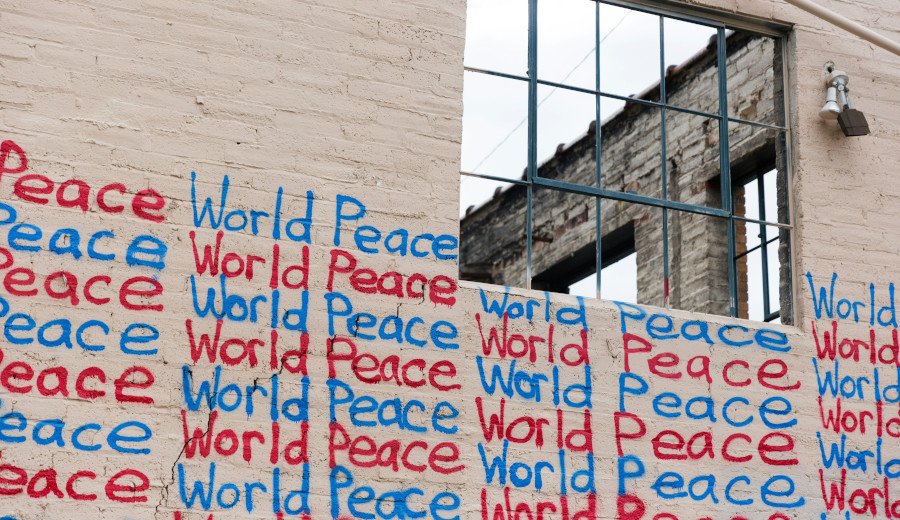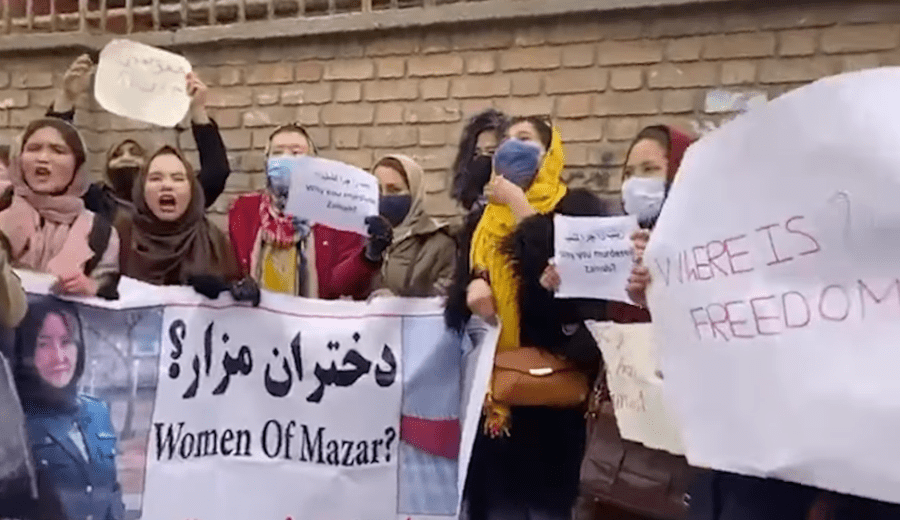25 reasons for activism in 2025

Story by Lina AbiRafeh
Photo by Tori Nefores / creative licence

Lina AbiRafeh is a global women’s rights expert, keynote speaker and writer. Here she offers 25 reasons why activism remains essential to achieve gender equality, human rights, and justice worldwide.

In January of 2024, I wrote a piece asking if 2023 had been a “good year” for women. The answer was obvious. I’m afraid to ask the same question this year because I know where we’ll land. The year before, I wrote a piece as I sifted through the barrage of resolutions to be a better you in search of ways to be a better us. Our resolutions are too often individual — and hardly ever collective.
Sure, every January we like to recommit to all our Big Goals like reading more books and eating less cookies, but the world isn’t moving in the right direction, and maybe — maybe?! — we should do something about it.
We’re only a few days into 2025, and this year I’m struggling. More than ever, I want to believe that this new year brings a global reboot — an ability to reset, to start over, to fix our mistakes, to clean the mess, to undo the harm we’ve done to ourselves, to each other, to the earth. Nope. We’re still the same — and we’re still in the same place.
Instead of drowning in a sea of despair, I’m reminding myself that there are many, many reasons why our activism must continue. So I’ve compiled a “short” list of 25 reasons to ignite our activism in 2025. There are probably a bazillion more things I could have added. And these aren’t in any particular order — there’s no hierarchy of crisis. These are just 25 things that are troubling me today. 25 things that remind me that we need to keep going…
1. The US-funded Israeli genocide of Palestinians continues, along with violence inflicted in Lebanon. In Lebanon there have been over 3,600 confirmed deaths. Over 46,000 Palestinians have been killed by Israelis, with thousands more buried under rubble or facing illness and starvation. [Editor’s note: this article was written before the ceasefire was announced by former President Biden on January 15, 2025]
2. Syria was finally freed from the al-Assad Regime, only to be bombed by Israel with 480 strikes from December 9–11, 2024 — marking the most violent attack on Syria in 15 years.
3. Famine in Sudan continues as we look on, while 8 million people risk starvation. All this as rival military factions continue to inflict suffering on the population.
4. The Taliban continues to crack down on women’s rights and fundamental freedoms in Afghanistan, with recent laws including stopping women from speaking in public or using public spaces.

5. Gangs have taken over Haiti, resulting in a collapse in governance, political instability, and widespread violence — including sexual violence. 80 percent of women and girls reported being subjected to some form of gender-based violence.
6. In the Central African Republic the civil war continues, resulting in a population vulnerable to violence and displacement. 1.4 million people are displaced.
7. The climate crisis is real, and extreme weather is fueling the displacement of millions, particularly in countries like Bangladesh, with an average loss of 300 lives a day due to climate.
8. The Democratic Republic of Congo still doesn’t know peace. Armed conflicts are perpetrated by militias fighting over resources, while civilians bear the brunt, with over 6 million deaths since 1996.
9. Trump took office this month — and his BROligarchy is set to undo any small gains we’ve made toward human rights and social justice. Women’s March noted a mindblowing increase of 4,600% in misogynistic rhetoric online and in real life after the election — and it is likely to get worse.
10. The Russia-Ukraine War is nearing its two year mark, resulting in over 3,200 casualties in Ukraine, mass displacement, and global economic instability.
11. North Korea continues to perpetrate human rights abuses, including labor camps and intimidation tactics such as forcing school children to watch executions.
12. Nearly 20% of the world’s children live in conflict zones while we look on, accepting that they might be “collateral damage,” and denying their rights to safe childhoods.
13. Humans continue to enslave each other at an alarming rate. Human trafficking and modern slavery are a global problem — 20% of those trafficked are children, with 60% of girls trafficked for sexual exploitation, 21% forced into labor, and 19% for other forms of abuse.
14. 2024 saw a record number of refugees — 43.7 million by mid-2024 — up 1% from 2023. This increase is fueled by wars, climate, and a range of instabilities. People are on the move more than ever — and nowhere is safe.
15. Military in Myanmar has escalated its use of sexual violence and other forms of violence to terrorize women and girls, notably against ethnic minorities, including the Rohingya.
16. The prevalence of female genital mutilation among women aged 15–49 in Somalia is 99.2% — the highest in the world.
17. The Chinese government has been accused of committing crimes against humanity against Uyghurs and other Turkic Muslims in Xinjiang, including forced labor and other human rights violations.
18. The number of missing women and girls has more than doubled worldwide over the past 50 years — exceeding 142.6 million.
19. The gender pay gap prevails, making life even harder for women. Globally, women earn 23% less than men.
20. The world is literally at war with over 110 armed conflicts, most of which are in Global Majority Countries — and most of which are funded by the US, Russia and EU member states.
21. At least 650 million girls and women alive in 2023 were married before their 18th birthday. That figure is likely higher today.
22. In 2024, Brazil’s Congress passed legislation that significantly impacts the land rights of Indigenous peoples, including women by reversing land allocations.
23. Globally, 27% of ever-partnered women aged 15–49 have experienced physical or sexual intimate partner violence at least once in their lifetime. The most dangerous place for women is in their own home.
24. Recent data shows that around 51,100 women were killed by femicide by their intimate partner or a family member worldwide. Femicide- the deliberate killing of a woman or girl, usually by a man, just because she is a woman — too often goes uncounted in crime statistics.
25. Violence against women continues. Not only in “other countries, other people, over there.” It’s everyone, everywhere, all the time. Just look at Gisele Pelicot — and millions like her. That alone should be enough to galvanize us into action.
How to take action
OK. Wow. That’s a big list. And it’s pretty daunting. So, what can we do about it? Hang on, I’ve got a list for that too!
1. Yes, it IS our collective problem — no matter where it happens. So, above all else, we gotta give a sh!t. Because this stuff matters –all systems of oppression are connected, we can and SHOULD fight for freedom for all of us.
2. Learn what’s going on. Read as much as we can — especially from local sources on the ground.
3. Listen to credible news sources from the frontlines — including citizen journalists.
4. Share this knowledge with our friends, family, and colleagues — or over social media — to raise awareness.
5. Join a protest if there’s one near us. Bonus: there usually is.
6. Donate to causes that compel us — especially community-based groups.
7. Sign a petition if there’s one going around. The numbers DO matter.
8. Vote for the politicians who share our values. Local elections matter too.
9. Support ethical businesses — especially those with diverse leadership who support fair wages and universal human rights.
10. Boycott those who don’t! See here for the updated BDS list.
11. Being kind to the planet starts at home — reduce, reuse, recycle, compost — whatever you can do. It’s usually a lot easier to build these habits into our daily lives than we think.
12. Volunteer physically or virtually and share our time with organizations who will benefit. There’s always more work to be done.

13. Stand up and speak out — hard to do, yes, but also critical for change. That kind of courage is absolutely contagious.
14. Focus on change in our communities by joining or starting movements that are addressing issues we care about in the places where we live.
15. Write, call, and otherwise pester our representatives to support the policies we believe in.
16. Challenge biases, discriminations, bigotry, and hate speech when you hear it. Yes, that includes your creepy uncle over the Thanksgiving table.
17. Read banned books! See here for the 50 most banned books in the USA.
18. Use art or whatever form of expression for advocacy — street art, photography, music, all of these can be powerful tools for social change.
19. Support the kids (especially the girls) in your orbit — our own children, our nieces and nephews, our neighbors — because they are our future.
20. Learn — and teach others — basic media literacy. Fake news abounds, and with the rise of deepfake AI, knowing what’s real and what’s not can literally save lives.
21. Give credit where credit is due. Too often, the achievements of women and other marginalized populations get swept under the rug, forgotten about, or, worse, stolen by someone else.
22. Don’t get bogged down in ideological purity. None of us are perfect — we’re evolving. Meet people where they’re at and remember that small steps DO matter. Give people a chance to change and be better. This is what we’re fighting for.
23. Challenge yourself and reflect regularly. We all have internalized biases. Where do we fall short and how can we do better?
24. Be intentional. Genuine compassion is a muscle that must be regularly exercised lest we become complacent. To build community, we must also give community.
25. Above all else, be kind. Why is that so hard?!
If you don’t know where to start, I’ve created a Feminist Firestarter — an activist calendar to get us all moving. Head to www.LinaAbiRafeh.com and Join the Movement — you’ll get the Firestarter and my monthly newsletter filled with bite-sized actions.
So there we have it. A short list of things to do. I’m not saying we should cancel our new gym memberships or put down our kale smoothies. We can be good to ourselves and good to the world. At least I’m gonna try, because I’d like January 2026 to come with a lot more hope — and a much shorter to-do list.

READ MORE

